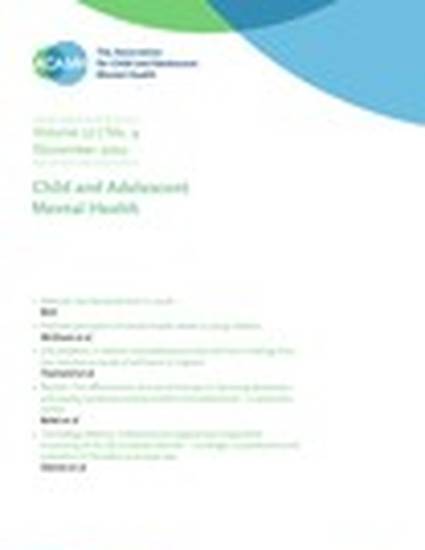
Article
Learning outcomes in primary school children with emotional problems: A prospective cohort study
Child and Adolescent Mental Health
(2022)
Abstract
Academic difficulties are common in adolescents with mental health problems. Although earlier childhood emotional problems, characterised by heightened anxiety and depressive symptoms are common forerunners to adolescent mental health problems, the degree to which mental health problems in childhood may contribute independently to academic difficulties has been little explored. Data were drawn from a prospective cohort study of students in Melbourne, Australia (N = 1239). Data were linked with a standardised national assessment of academic performance at baseline (9 years) and wave three (11 years). Depressive and anxiety symptoms were assessed at baseline and wave two (10 years). Regression analyses estimated the association between emotional problems (9 and/or 10 years) and academic performance at 11 years, adjusting for baseline academic performance, sex, age and socioeconomic status, and hyperactivity/inattention symptoms. Students with depressive symptoms at 9 years of age had lost nearly 4 months of numeracy learning two years later after controlling for baseline academic performance and confounders. Results were similar for anxiety symptoms. Regardless of when depressive symptoms occurred there were consistent associations with poorer numeracy performance at 11 years. The association of depressive symptoms with reading performance was weaker than for numeracy if they were present at wave two. Persistent anxiety symptoms across two waves led to nearly a 4 month loss of numeracy learning at 11 years, but the difference was not meaningful for reading. Findings were similar when including hyperactivity/inattention symptoms. Childhood anxiety and depression are not only forerunners of later mental health problems but predict academic achievement. Partnerships between education and health systems have the potential to not only improve childhood emotional problems but also improve learning.
Keywords
- Emotional disturbances,
- Academic achievement,
- Primary school students,
- Cohort analysis,
- Numeracy,
- Reading achievement,
- Depression (Psychology),
- Anxiety
Disciplines
Publication Date
2022
DOI
https://doi.org/10.1111/camh.12607
Citation Information
Lisa K Mundy, Louise Canterford, Margarita Moreno-Betancur, Monsurul Hoq, et al.. "Learning outcomes in primary school children with emotional problems: A prospective cohort study" Child and Adolescent Mental Health (2022) ISSN: 1475-3588 Available at: http://works.bepress.com/petra_lietz/110/
Creative Commons license

This work is licensed under a Creative Commons CC_BY-NC-ND International License.
